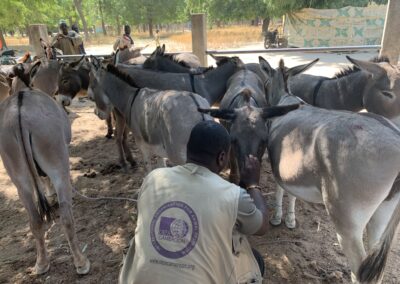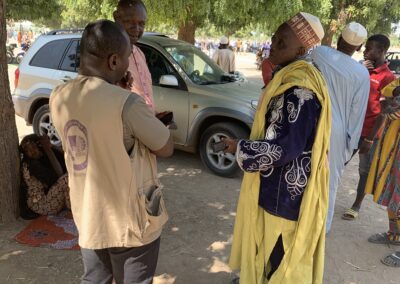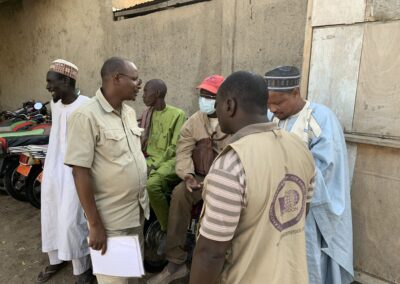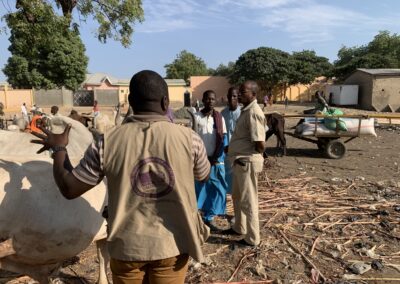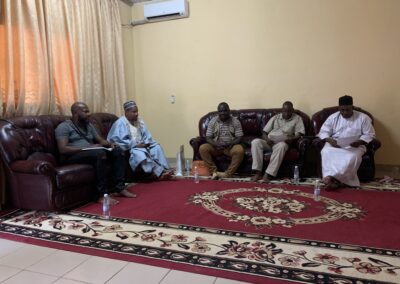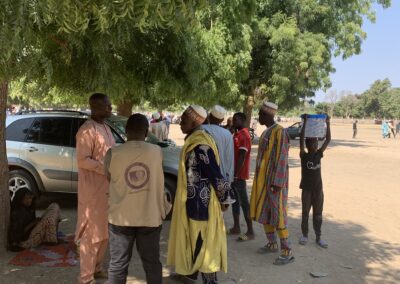RESULTS OF OIPA CAMEROON CAMPAIGN AGAINST DONKEY SKIN TRADE
In 2023, OIPA Cameroon through the support of OIPA International partnered to undertake a project dubbed, ‘Addressing Illegal Cross Border Movement of Donkeys on The Cameroon-Nigeria Border and Improving the welfare of working donkeys in the Far North Region Cameroon’.
The targeted area for this project is the Bogo municipality particularly in the TCHABAWOL, BADAL and KAELE villages in the Far North Region of Cameroon.
The Extreme North Region is the most populated region in Cameroon with over 4.000.000 inhabitants and has a surface area of 34.263KM square, it borders the Northern Region to the South, The Republic of Chad to the East and The Federal Republic of Nigeria to the West, and the regional headquarter is Maroua.
The overall goal of this project was to achieve a disruption of illegal cross-border movement and the donkey hide trade along the Cameroon-Nigeria border.
OIPA Cameroon was to collect relevant information on the ground in order to establish the existence, nature and extent of cross-border movement of donkeys between Cameroon and Nigeria, resulting to donkey slaughter and skin trade. This information was to be presented to relevant authorities at the region, in turn facilitate policy change and administrative actions.
Similarly, OIPA and the communities in collaboration with the government would additionally use the information for advocacy and public awareness. Working with the communities and other stakeholders in the border points, the project would also inform interventions to curb any illegal movements and regulate cross border donkey trade through policy and community actions.
The specific objectives of the project were six-fold:
- To establish the existence, nature and extent of cross-border movement of donkeys between Cameroon and Nigeria
- To Sensitize the Community on the donkey trade and its effects on their livelihoods; and empower them in order to address any animal welfare issues resulting from the nature and structure of donkey trade.
- To establish gaps on existing laws and policies on donkey cross-border movement and trade (formal or informal).
- To create awareness within the media on the donkey trade and its effects on community livelihoods.
- To advocate with the regional level for the formulation of policies and regulations that discourage the illegal donkey cross-border movement.
- Develop an easy-to-read publication on the overall findings of the project
Implementation
The project achieved the following three outcomes to meet the goals and objectives, thus:
- Nature and structure of donkey movement and trade across the border (Cameroon and Nigeria) was fully understood.
- There was continues community involvement in the campaigns against cross-border movement of donkeys, slaughter and skin trade.
- There was development of Policy and legislation, advocacy and petitions at county level as well as policy brief that was shared to the government officials and other key policy makers/stakeholders for implementation.
By the end of the project life, the following results were achieved as thus;
- The project established that there existed significant movement of donkeys along the Cameroon – Nigeria border, with approximately 60 donkeys moving from Cameroon to Nigeria every day destined for the donkey abattoirs.
This was because donkey traders in both Cameroon and Nigeria considered this a lucrative trade since they got better prices across the border in Cameroon. It was noted that the movement was largely illegal, through undefined and unofficial routes that evaded the formal border crossing points. Seven (6) unofficial routes were identified along the Cameroon –Nigeria border stretch. - Stakeholders’ workshop bringing together donkey’s owners, famer’s community leaders and official from the ministry of Livestock was held in which pertinent issues touching on the plight of donkeys were deliberated and way forward documented. As a result, key donkey welfare stakeholders from communities are discussing ways of curbing the cross-border trade.
- The project realized concerted community discussion forum in ZAMIA and TCHABAWOL communities to highlight the plight of donkeys destined for slaughter and the perils associated with trade in donkey skin and meat.
- Four donkey owners’ forums (Zamia , Tchbawol, Kaele and Wafango) have been established bringing together and 30 community members selected to be trained in surveillance and monitoring of the donkey welfare in their localities. Further, in collaboration with OIPA Cameroon develop and present a petition calling for a total ban on donkey slaughter in these communities.
- The project will Develop a Policy Brief and easy to read publication on the laws and regulations on donkey movement in both Cameroon and Nigeria.
Conclusion
Project’s findings showed that due to the porous nature of Cameroon Nigeria border especially on Zamia and Tchabawol community’s border points. A research and intelligence indicated that all the donkeys that crossed the border (about 60 in a day) were normally stolen/bought from Cameroon. This, in effect, had caused untold suffering to the communities living near the border and also relying on the animal for their livelihoods as the unscrupulous traders stole their donkeys along the way to their destinations – slaughterhouses, to add up onto their plunder from Cameroon.
It was the considered view of the project that if the existing chain of donkey cartels was not broken, donkey trade halted, and donkey abattoirs closed, these communities would continue to suffer and wallow in abject poverty, hence losing their human dignity.
Further, donkey theft along the border communities, which has been largely undocumented, has been on the rise being partly fueled by illegal movement. There have also been reported cases of inhumanely donkey bush slaughter and harvesting of their skins.
Next steps
OIPA Cameroon is hoping to raise $1000 to empower 30 community members and local administration within Zamia and Tchabawol communities with knowledge and skills about the donkey skin trade and its implication on communities, including ways of enhancing reporting and data collection of reported theft and movement incidences. This is being incorporated through creating a reporting chain with data collection tools to be adopted by the local authorities. Further, the project will engage and empower law enforcement officers living with communities and those working at the Cameroon-Nigeria border on the current prevailing legal notice 34 and its enforcement.
They will work in collaboration with officials from the ministry of livestock. Custom officials and the law enforcement m to report cased of donkey trade and donkey movement along the border.


Write note “DONATION TO OIPA CAMEROON” and the exact amount
Bank Account:
OIPA – Organizzazione Internazionale Protezione Animali – ONLUS
Bank Name and Address:
Banca Intesa San Paolo – Agency MILAN-BOCCHETTO – Via Bocchetto 13/15 – 20123 Milan (Italy)
Bank details:
IBAN Code: IT93I0306909620100000002326
SWIFT Code: BCITITMM
Bank Account Number: 100000002326


